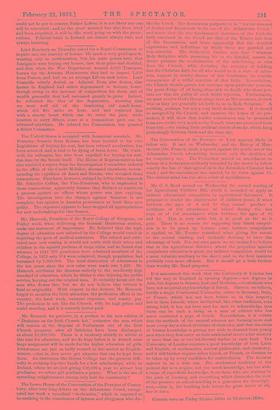Mr. Hancock, President of the Royal College of Surgeons, on
Friday week, when delivering the biennial Hu.nterian oration, made one statement of importance. He believed that the high degree of education now enforced by the College would result in ,depriving the poor of medical assistance. The refined and culti- vated men now coming in would not settle with their wives and children in the squalid purlieus of large cities, and he found that whereas in 1842 670 gentlemen were admitted members of the -College, in 1872 only 374 were admitted, though population had increased by 7,000,000. The total diminution of admissions in the ten years since the new rules were made was 1,420. Mr. Hancock attributes the decrease entirely to the needlessly high -standard of education, which he thinks is also injuring the public service, keeping out the original men. It certainly keeps out the men who flower late, but we do not believe that culture is fatal to originality. With respect to the doctors, Mr. Hancock forgot to mention the little attraction the profession offers in the country, the hard work, constant exposure, and scanty pay. The profession is not like the Church, with its high prizes and social standing, and it is scarcely better paid.


































 Previous page
Previous page